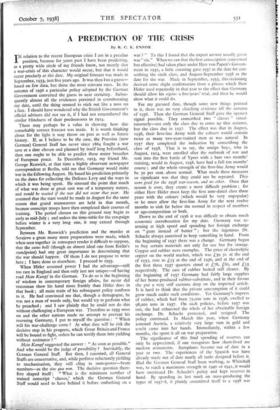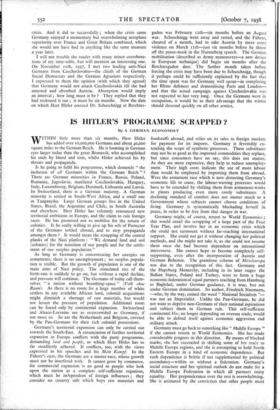A PREDICTION OF THE CRISIS
By R. C. K. ENSOR
There may perhaps be a value in showing how this remarkably correct forecast was made. It is worth thinking about for the light it may throw on past as well as future history. If, as I believe to be the case, the Prussian (now German) General Staff has never since 1864 fought a war save at a date chosen and planned by itself long beforehand, then one ought to be able to predict these major breaches of European peace. In December, 1913, my friend Mr. George Renwick, at that time a highly observant newspaper correspondent at Berlin, told me that Germany would make war in the following August. He based his prediction primarily on the dates for collecting the Defence Levy and the ways in which it was being spent. He stressed the point that much of what was done at great cost was of a temporary nature, and would be wasted if the war did not occur that year. He assumed that the start would be made in August for the same reason that grand manoeuvres are held in that month, because conscript troops have then completed their courses of training. The period chosen on this ground may begin as early as mid-July ; and unless the time-table for the campaign before winter is a very long one, it may extend through September.
Between Mr. Renwick's prediction and the murder at Serajevo a great many more preparations were made, which when seen together in retrospect render it difficult to suppose, that the cants belli (though an almost ideal one from Berlin's standpoint) had any great importance in determining that the war should happen. Of them I do not propose to write here ; I have done so elsewhere. I proceed to 1933.
When Hitler assumed power I had the advantage—still too rare in England and then only just not unique—of having read Mein Kampf in the German. To do so is the beginning of wisdom in contemporary foreign affairs, for never did statesman show his hand more frankly than Hitler does in that book ; all main traits of his subsequent policy conform to it. He had convinced me that, though a demagogue, he was not a man of words only, but would try to perform what he preached ; and I saw plainly that he could not do this without challenging a European war. Therefore as 1933 wore on and the other nations made no attempt to prevent his rearming Germany, I put to myself the question : " When will his war-challenge come ? At what date will he risk the decisive step in his progress, which Great Britain and France will be bound to fight, unless he can terrify them into yielding without resistance ? "
Mein Kampf suggested the answer : " As soon as possible." And who would be the judge of possibility ? Inevitably, the German General Staff. But then, I reasoned, all General Staffs are conservative, and, while perforce reluctantly yielding to mechanisation, they still cling to man-power—brute numbers—as the sine qua non. The decisive question there- fore shaped itself : " What is the minimum number of trained conscript ` classes,' which the German General Staff would need to have behind it before embarking on a war ? " To this I found that the expert answer usually given was" six." When we saw that the first conscription (unavowed but effective) had taken place under Herr von Papen's Govern- ment in 1932, a little counting gave 1937 as the date for con- scribing the sixth class, and August-September 1938 as the date for the war. Made in September, 1933, this reckoning derived some slight confirmation from a phrase which Herr Hitler used repeatedly in that year to the effect that Germany should allow his regime a five-years' trial, and then he would show what it could do.
For my guessed date, though some new things pointed to it, there was no very clinching evidence till the autumn of 1936. Then the German General Staff gave the opencst signal possible. They conscribed two " classes " simul- taneously—not only the class due to come up that autumn, but the class due in 1937. The effect was that in August, 1938, their first-line Army with the colours would contain twice as many two-year-trained men as was natural. In 1937 they completed the indication by conscribing the class of 1938. That is to say, the unripe boys, who in August, 1914, were enrolled after the outbreak of war and sent into the first battle of Ypres with a bare two months' training, would in August, 1938, have had a full ten months' course ; and the whole strength of the first-line Army would be 5o per cent. above normal. What made these measures so significant was that they could not be repeated. They were good for the 1938 war-season, and no other. Once that season is over, they create a most difficult problem ; for either Herr Hitler must keep the first ante-dated class three years with the colours (which would be very unpopular) or he must allow the first-line Army for the next twelve months to sink far below the normal in respect of numbers or age-composition or both.
Down to the end of 1936 it was difficult to obtain much economic corroboration for my date. Germany was re- arming at high speed and spending her foreign exchange on " guns instead of butter " ; but the ingenious Dr. Schacht always contrived to keep something in hand. From the beginning of 1937 there was a change. Germany began to buy certain materials not only for use but for storage. Copper and rubber were examples. The price of electrolytic copper on the world market, which was £39 5s. at the end of 1935, rose to £53 at the end of 1936, and at the end of the first three 1937 quarters stood at £78, £61, and £53 respectively. The case of rubber looked still clearer. By the beginning of 1937 Germany had fairly large supplies of her home-produced rubber-substitute, and in their favour she put a very stiff customs duty on the imported article. It is hard to think that the private consumption of it could grow much under such conditions. Yet Germany's imports of rubber, which had been 72,000 tons in 1936, swelled to 98,000 tons in 1937. On such policies, before 1937 was out, she had exhausted the whole of her obtainable foreign exchange. Dr. Schacht protested, and resigned. The policy continued. In March this year, when Germany annexed Austria, a relatively very large sum in gold and credit came into her hands. Immediately, within a few months, she spent it all on war preparation.
The significance of this final spending of reserves can only be appreciated, if one recognises how short-lived arc modem armaments. Aeroplanes become out of date in a year or two. The experiences of the Spanish war have already made out of date nearly all tanks designed before it. Had the German General Staff been working, as Whitehall was, to reach a maximum strength in 1940 or 1941, it would have continued Dr. Schacht's policy and kept reserves in hand. By spending its last mark on mass-producing the types of 1937-8, it plainly committed itself 'to a 1938 war crisis. And it did so successfully ; when the crisis came Germany enjoyed a momentary but overwhelming aeroplane superiority over France and Great Britain combined, which she would not have had in anything like the same measure a year later.
I will not trouble the reader with many minor corrobora- tions of my time-table, but will mention an interesting one. On November nth, 1937, I met two leading anti-Nazi Germans from Czechoslovakia—the chiefs of the German Social Democrats and the German Agrarians respectively. I expressed to them the opinion (with which they agreed) that Germany would not attack Czechoslovakia till she had annexed and absorbed Austria. Absorption would imply an interval ; how long must it be ? They replied that they had reckoned it out ; it must be six months. Now the date on which Herr Hitler coerced Dr. Schuschnigg at Berchtes- gaden was February 12th—six months before an August war. Schuschnigg went away and ratted, and the Fiihrer, cheated of a month, had to take Austria by more overt violence on March nth—just six months before he threw off the peace-mask in the Nuremberg speech. The German mobilisation (described as Army manoeuvres—a new device in European technique) did begin six months after the Berchtesgaden date. The further month taken before forcing the crisis may have been due to Schuschnigg, though it perhaps could be sufficiently explained by the fact that the time spent was for Germany well spent—in completing her Rhine defences and demoralising Paris and London— and that the actual campaign against Czechoslovakia was not expected to last very long. Once the Germans were in occupation, it would be to their advantage that the winter should descend quickly on all other armies.















































 Previous page
Previous page